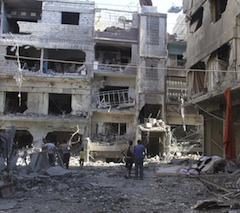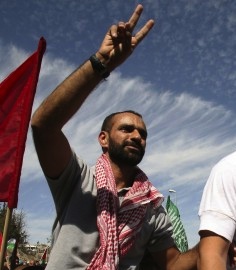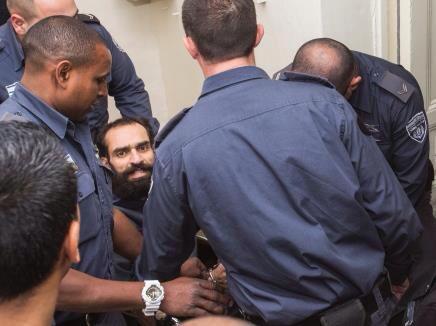Reem Kelani’s overview of 2013: “many wonderful experiences”
 Palestinian artist Reem Kelani has had a busy 2013, that’s for sure. On her website, she published an overview of all the things she has been up to this year. An impressive string of accomplishments, from this impressive vocalist, composer and musicologist who continues to contribute to the preservation of Palestinian folkore, tradition and continued musical development through her valuable musical endeavours and projects. The content of her 2013 overview was republished here with her specific permission. We congratulate her on her efforts, and hope that 2014 continues to be just as productive!
Palestinian artist Reem Kelani has had a busy 2013, that’s for sure. On her website, she published an overview of all the things she has been up to this year. An impressive string of accomplishments, from this impressive vocalist, composer and musicologist who continues to contribute to the preservation of Palestinian folkore, tradition and continued musical development through her valuable musical endeavours and projects. The content of her 2013 overview was republished here with her specific permission. We congratulate her on her efforts, and hope that 2014 continues to be just as productive!
My year to date has already had many wonderful experiences, not to mention a lot of hard graft. Here are some of the highlights.
In March, I performed live on the Kurdish STERK TV in their studios in Denderleeuw, near Brussels. The programme was to mark International Women’s Day. One of the pieces I sang was a medley of a Kurdish and a Palestinian lullaby. Later that month, I had the honour of singing at a fundraiser in Bradford at the launch of the Abu Bakr Rauf Scholarship Fund, in memory of a remarkable man and tireless activist for the Palestinians.
In April, I was back in Seattle with my band, 5 years after our appearance at the Seattle International Children’s Festival. Alongside a concert at the city’s principal community venue, Bruno Heinen and I gave a duo performance in the more intimate surroundings of Traditions Cafe in Olympia, as well as a master class at the prestigious Cornish College of the Arts. The Olympia event was supported by the Rachel Corrie Foundation, and we were honoured to have Cindy and Craig Corrie among the audience. Special thanks go to Brian Faker, Sally Brownfield and Mohammed Bentlemsani for their hard work in making the tour possible.
On my way back to London, I stopped over in Vancouver and gave a performance on behalf of the Boycott Israeli Apartheid Campaign, accompanied by the impressive Canadian ‘oud player Gordon Grdina.
August saw me at the historic Traquair House in Scotland, as part of the Beyond Borders Festival, an important and intimate political and literary gathering. I gave a solo presentation entitled from Tahrir to Traquair about songs of protest.
 During October, I did a two-week residency at schools in Calderdale which was immensely satisfying. It was a first for me, inasmuch as it was the first time in my career that I have had institutional funding for my work, from the Arts Council of England. The children of Parkinson Lane and Old Town Primary Schools did me, their teachers and parents proud with the most uplifting performance of Palestinian and Egyptian songs. Particular thanks must go to local community activists from Halifax Friends of Palestine, led by Councillor Jenny Lynn, for their remarkable support with the arrangements.
During October, I did a two-week residency at schools in Calderdale which was immensely satisfying. It was a first for me, inasmuch as it was the first time in my career that I have had institutional funding for my work, from the Arts Council of England. The children of Parkinson Lane and Old Town Primary Schools did me, their teachers and parents proud with the most uplifting performance of Palestinian and Egyptian songs. Particular thanks must go to local community activists from Halifax Friends of Palestine, led by Councillor Jenny Lynn, for their remarkable support with the arrangements.
My year has also been interspersed with performances as part of the Anti-Capitalist Roadshow, alongside the legendary Leon Rosselson and other greats of folk music, Roy Bailey, Robb Johnson and Peggy Seeger.
Throughout the year, when not on tour, I have continued work on my Sayyid Darwish project. Subject to receiving additional funding to complete the work, the plan remains to produce a double album of 14 tracks, including a ‘dawr’ or long song form which will be 20+ minutes, plus an instrumental composition in honour of Sayyid Darwish. Alongside the music, there will be two small books, one in English and the other in Arabic, tailored to each audience. The books will contain the fruits of my own research into the history, musicology and language of each song, plus the lyrics in Arabic and translations into English.
With a further recording session planned in early December, I hope by the end of the year to have recorded the body of 10 tracks. For these songs, which mostly relate to Darwish’s short songs, I have been using my hugely talented (and largely British / European) core musicians. Once the body of each track has been laid, I face the lengthy process of editing, mixing and mastering the songs, expertly helped by my sound engineer and friend, Steve Lowe.
 With respect to the remaining 4 tracks, I had been planning to record the body of those songs in Cairo with musicians who are specialists in Egyptian music. I had hoped to proceed with this during 2013, but our plans were thwarted by the deteriorating security situation, especially vis a vis Palestinians. In consequence, we are not sure when we might be able to accomplish this part of the work. It may be that I will have to record these tracks outside Egypt.
With respect to the remaining 4 tracks, I had been planning to record the body of those songs in Cairo with musicians who are specialists in Egyptian music. I had hoped to proceed with this during 2013, but our plans were thwarted by the deteriorating security situation, especially vis a vis Palestinians. In consequence, we are not sure when we might be able to accomplish this part of the work. It may be that I will have to record these tracks outside Egypt.
In view of the delays which the main project faces, I have been working to release a live album, comprising a professional recording of my concert at the Tabernacle, London W11 in November 2012. I am hoping to finalise the writing and design of the album cover and booklet over the coming months and to send the album to print in the first half of 2014.
In the course of 2013, two further pieces of my music have been published:
a) The title music for a documentary called ‘Les Chebabs de Yarmouk’ about the refugee camp outside Damascus by the French film-maker, Axel Salvatori-Sinz.
b) Two songs for an album with the Anti-Capitalist Roadshow collective: one in English is a duet with the legendary songwriter Leon Rosselson, and the second is my arrangement of a Tunisian anthem Babour Zammar.
Looking ahead to 1 December, I will be performing at St Lukes, Holloway, London, a new commission which I jointly composed entitled Cry Palestine, together with the Vox Holloway choir.
My programme for 2014 is also beginning to take shape and includes: a) On 22 March, a joint concert with the leading Turkish collective, Kardes Turkuler, at TIM Maslak in Istanbul. They are such a pleasure to work with and I am so excited about my return to Istanbul. You can see a clip of us in action together when I performed with them as a special guest in June 2009;
b) A possible return tour of Washington State and Vancouver, if we can put the rather complex arrangements in place;
c) Performances as a soloist with the Bergen Philharmonic orchestra in a special production for the Bergen International Festival in May.
Like all musicians, we are struggling with the trend amongst consumers not to pay for recorded music. Without the support of so many people who do buy my albums, as well as tickets for my concerts and workshops, I would not be able to continue with my work. I am also hugely indebted to a small group of private sponsors, who have supported my Sprinting Gazelle and Sayyid Darwish album projects. A pernicious obstacle remains, however, and it is particular to those Palestinian artists who maintain the Palestinian narrative, and that is the continuing reluctance of some in the media and the music industry to give us a platform. Whether it be the Seattle Times or parts of the BBC, that reluctance continues to count against us.
In response to this, I will continue to focus on the grassroots and on those great people who make up my audiences and who show such unconditional appreciation of my work.
With thanks and warm wishes to all,
Reem
19/11/2013




Recent Comments